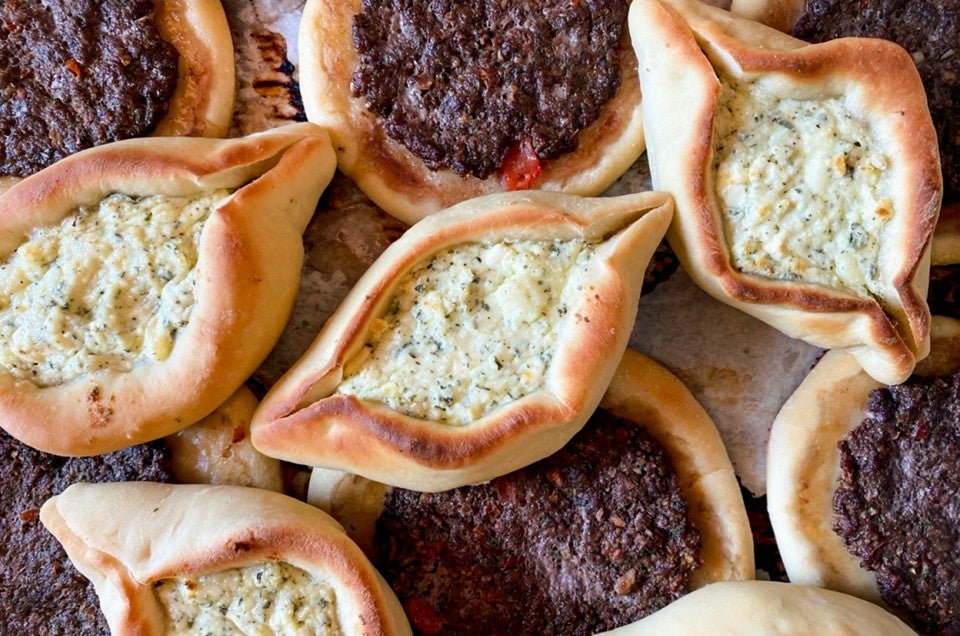


With Ramadan on the horizon, blogger Heifa Odeh of Fufu's Kitchen joins us to write about a special recipe she always makes this time of year: fatayer, a savory stuffed hand pie made with a variety of aromatic fillings.
* * *
Have you ever heard of Fatayer, the delicious pie appreciated across the Middle East?
You may be thinking of dessert when you hear the word pie, am I right? It’s quite the opposite, actually! Fatayer are Middle Eastern savory pies with many popular fillings and toppings, the most favored being cheese, meat, and spinach. I like to say that fatayer are to Arabs what empanadas are to Spaniards or calzones to Italians.
These pies symbolize much more than just mouthwatering bites of food. To me, this dish holds many memories of being in the kitchen with my mother kneading dough, filling, shaping, baking, and enjoying as a family.
As I got married and moved farther away from family, baking these have always made me feel right at home. Frankly, fatayer are one of my favorite things to eat. (I may or may not enjoy them weekly!) Growing up, they were always highly requested in our household, and for good reason.
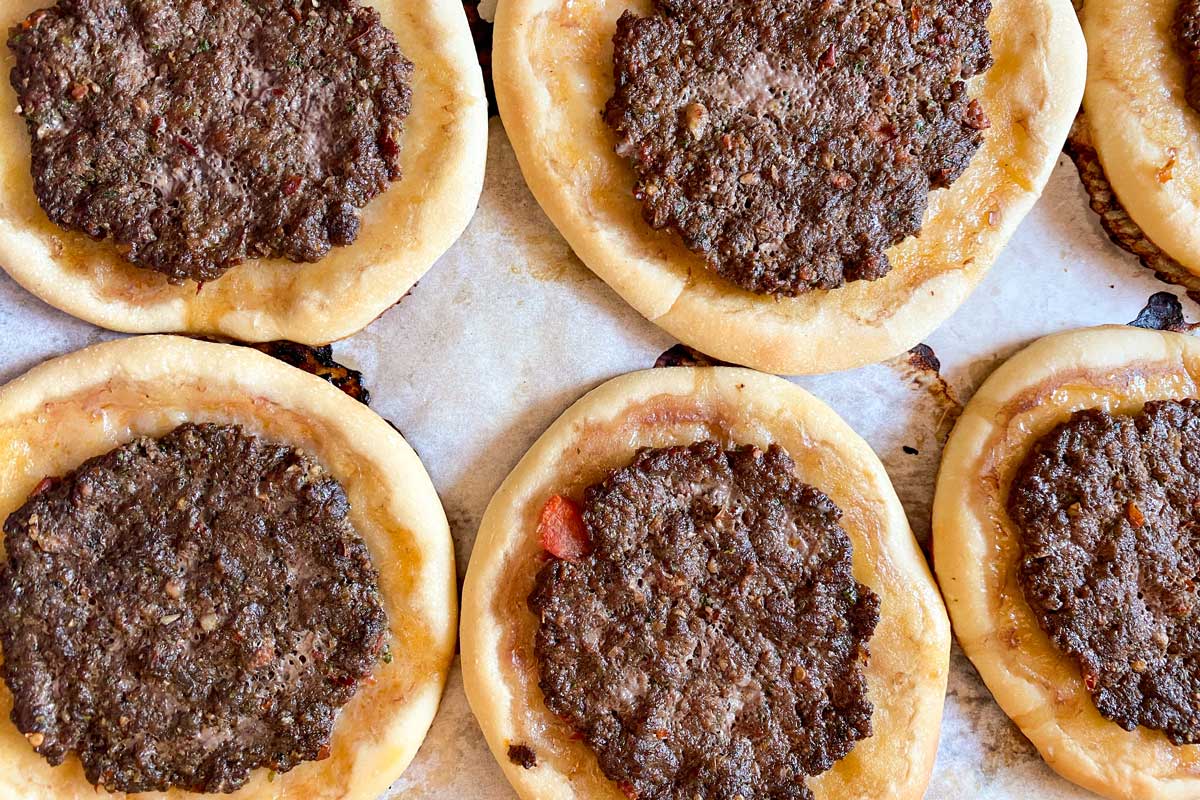
My mom and I would make batches of these hand pies and give them to family, friends, and our neighbors to enjoy. We did this especially during the holy month of Ramadan. Just as Christians often gift cookie plates to their fellow friends, neighbors, or co-workers around Christmas time, my Muslim family would offer boxes of freshly baked fatayer and other delicacies during this holy month, especially to those in need.
Ramadan is the ninth month of the Islamic calendar, a time of spiritual reflection that Muslims worldwide observe by fasting from sunrise to sunset, praying and reflecting for an entire month. Fasting reminds us to remember those who are less fortunate, while praying often and reflecting is meant to purify the soul in an effort to be closer to God.
Ramadan is also a time of gathering and giving. And what’s more beautiful than centering around food at a dinner table to break one’s fast alongside those you love?
In our family, we make fatayer as a side to dinner (iftar), because everyone loves them. And leftovers are always welcomed as they make the perfect snack, too. My preferred choice has always been cheese pies (Fatayer Jibneh) with spinach pies (Fatayer Sabanekh) being a very close second. I’ll admit, I may be biased as I love cheese, and cheese with fresh bread is just irresistible. Ask the men in my family, however, and they will tell you they love the meat pies most (Fatayer Sfeeha).
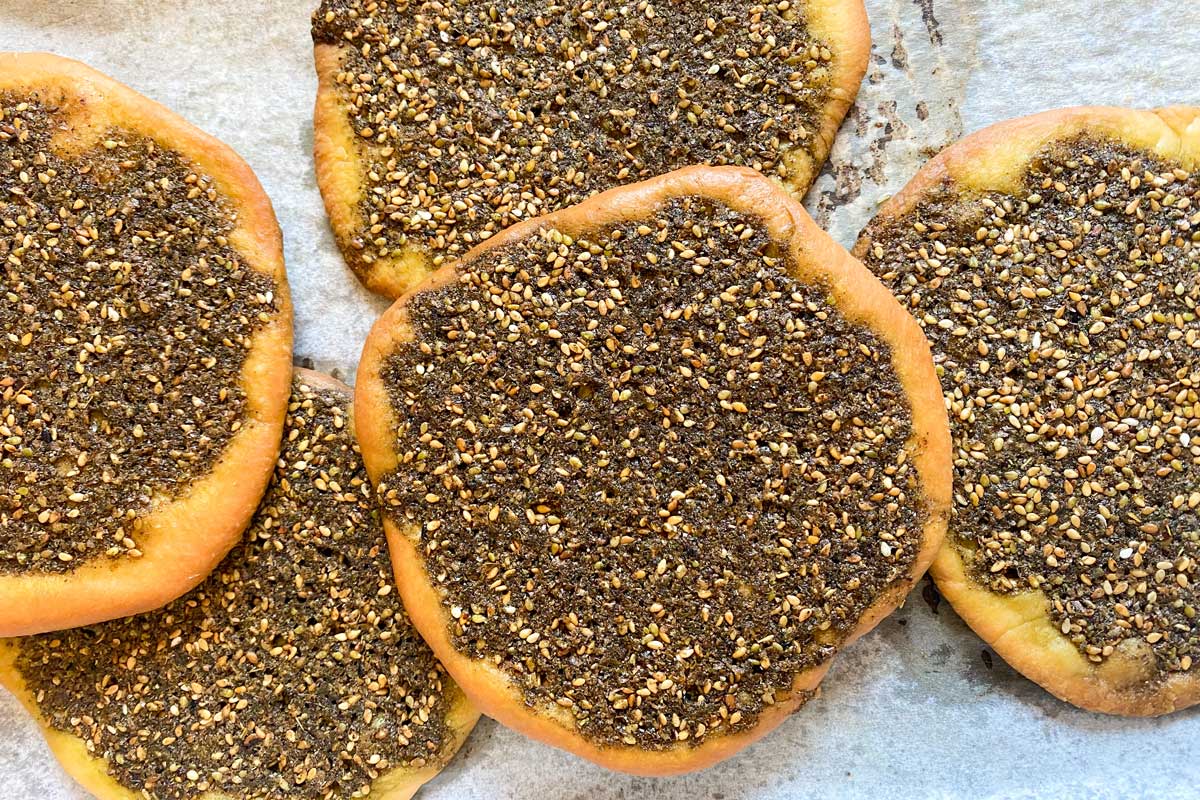
If you haven’t tried making your own fatayer — maybe you usually buy them, or perhaps they’re entirely new to you — it may be uncharted territory in the kitchen. But if you really think about it, these aren’t that far off from many recipes you may have enjoyed in the past.
Now, you may be thinking: How do we make these because they sound delicious?
It’s quite simple, actually.
Here is my full recipe for Fatayer, where I share how to make the dough and the most traditional of fillings. As a Palestinian, the flavoring of my fillings may be slightly different than how people from other regions of the Middle East customarily make them. Depending on the country, sometimes different spices, herbs, or vegetables are used. This recipe, however, is exactly how my mother and I, along with generations of women in my family, have prepared fatayer for years.
I know how intimidating making homemade baked goods can be, especially if you don’t work with yeast dough that much. However, this dough is so fast and easy to make. It doesn’t need hours of prep, proofing, and kneading, but rather a few ingredients and a little of your time. You will be left with a beautifully smooth and fluffy dough. (Did I mention it’s vegan too?)
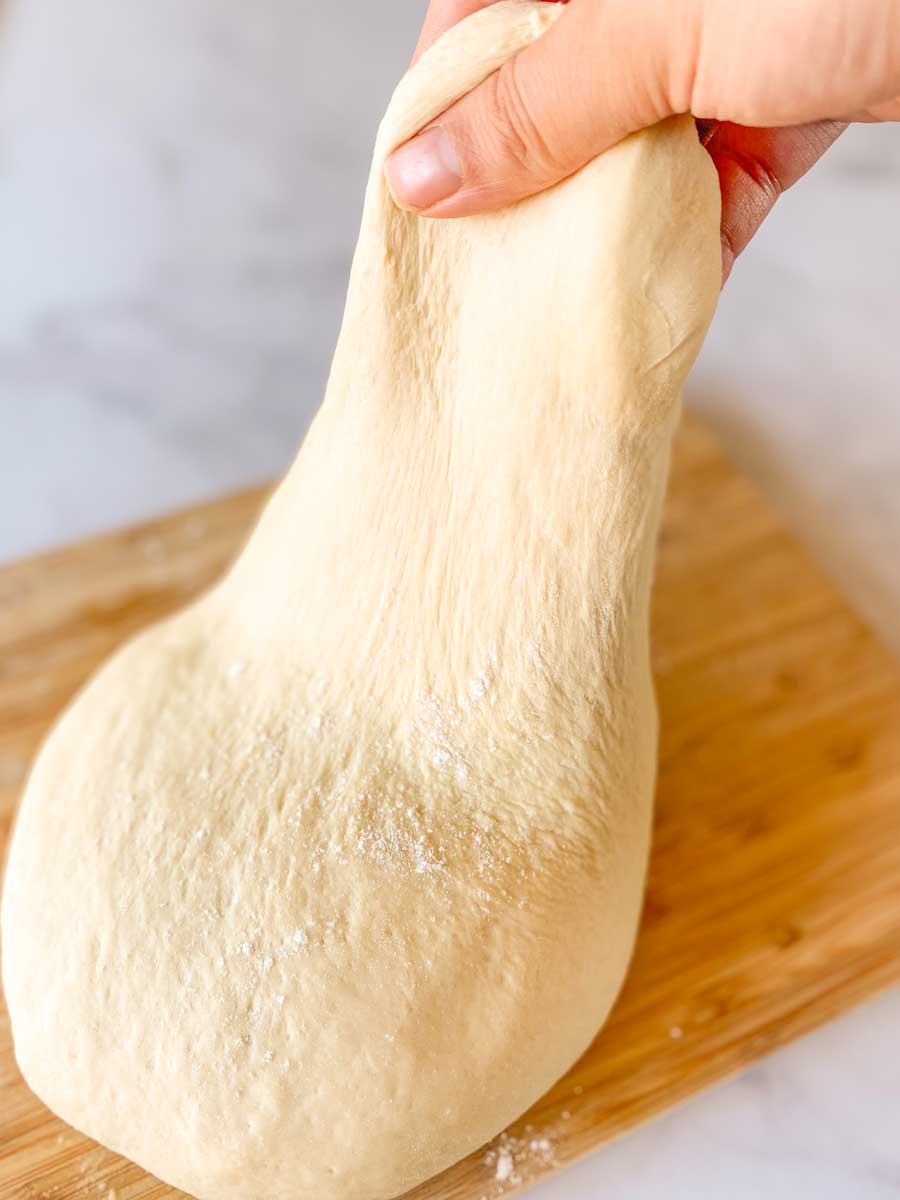
To save time, you can get started on the fillings while the dough proofs. For the cheese, expect a savory and creamy bite with notes of freshness from the dried mint. Meanwhile, the meat filling is perfectly seasoned with allspice and a fresh salsa. Both go wonderfully with this easy dough recipe passed down by my mother.
Once the dough is ready to be shaped, all you have to do is roll out small balls and flatten them into 4" rounds. Add the desired topping right in the center and spread out, leaving 1” uncovered around the edges for the meat pie. For the cheese, you can create a different design that looks just like a boat. Flatten the dough like a disc and fill the center with cheese before closing both ends together.
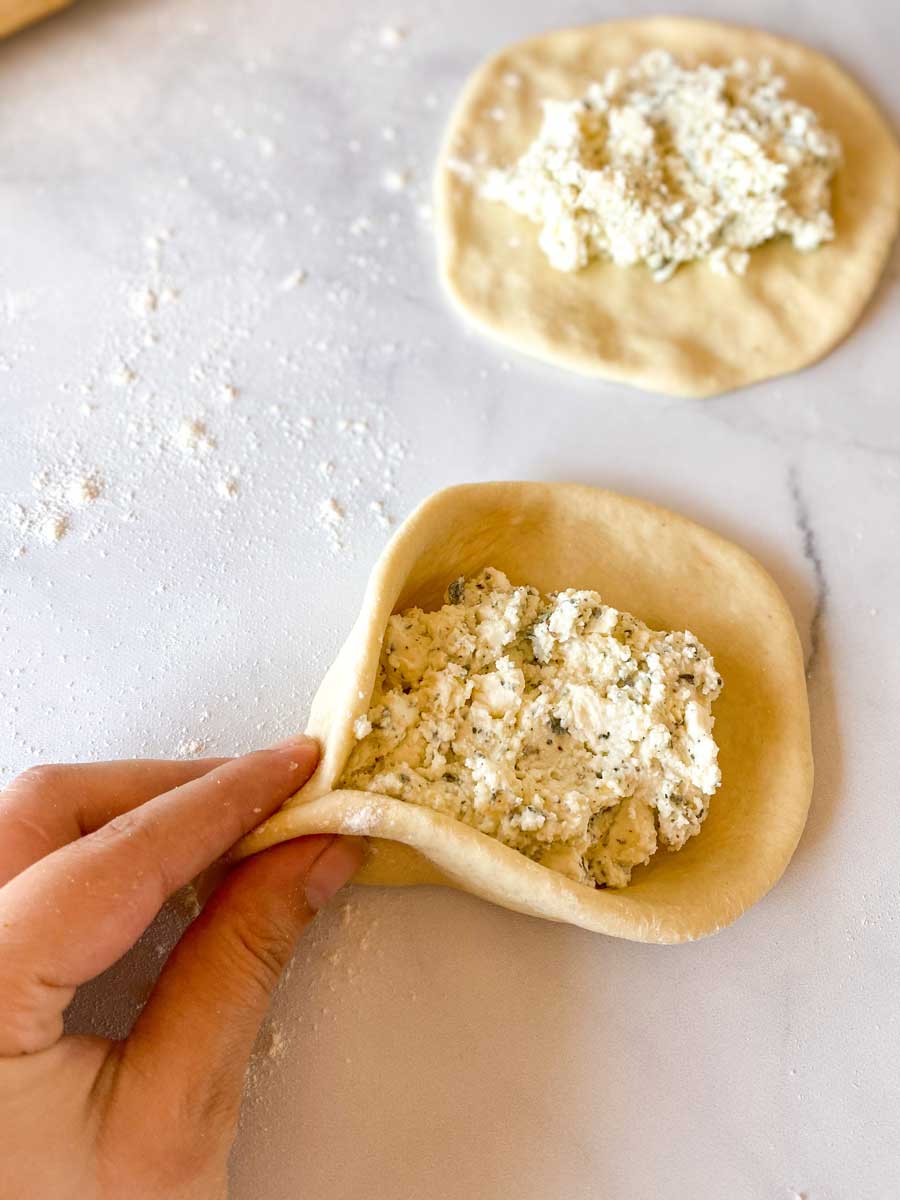
Then all that’s left is to bake! Place on a parchment-lined baking sheet with 2" of space in between and bake for 15 to 20 minutes at 350°F. If desired, you can also broil for a minute to achieve nice coloring on top. The fatayer should be fluffy and golden brown at the bottom and edges.
Traditionally, we enjoy these warm or at room temperature, either on their own or as a side, or with a cup of mint tea for the perfect brunch. These also freeze well, making them ideal when you want to just warm up a snack. They'll keep at room temperature for two days before placing in the fridge or freezer in an airtight container to be enjoyed at a later time.
Beyond just meat and cheese, there are plenty of other ways to fill or top your fatayer. Two additional versions, both of which are included in the “tips” section at the bottom of the recipe page, include:
Spinach: If you’re trying alternate fillings, definitely make an effort to enjoy the spinach pies, which are tangy and entirely vegan. Traditionally these are shaped like a triangle, but you can always add the spinach filling on top of the dough and bake for an easier process. See the Fatayer recipe page for full details on how to make them.
Za’atar: Another fantastic option is za’atar (a mix of dried ground oregano, thyme, sesame, and sumac) mixed with olive oil, which forms the perfect paste to make a very common fatayer topping. It’s super-simple to make and another delicious vegan option. The recipe page calls for 1/2 cup (100g) olive oil and 3 tablespoons za'atar, though lately I've been using 1/3 cup (67g) olive oil with 1/4 cup za’atar, which has a more paste-like consistency. Feel free to choose the amounts you prefer!
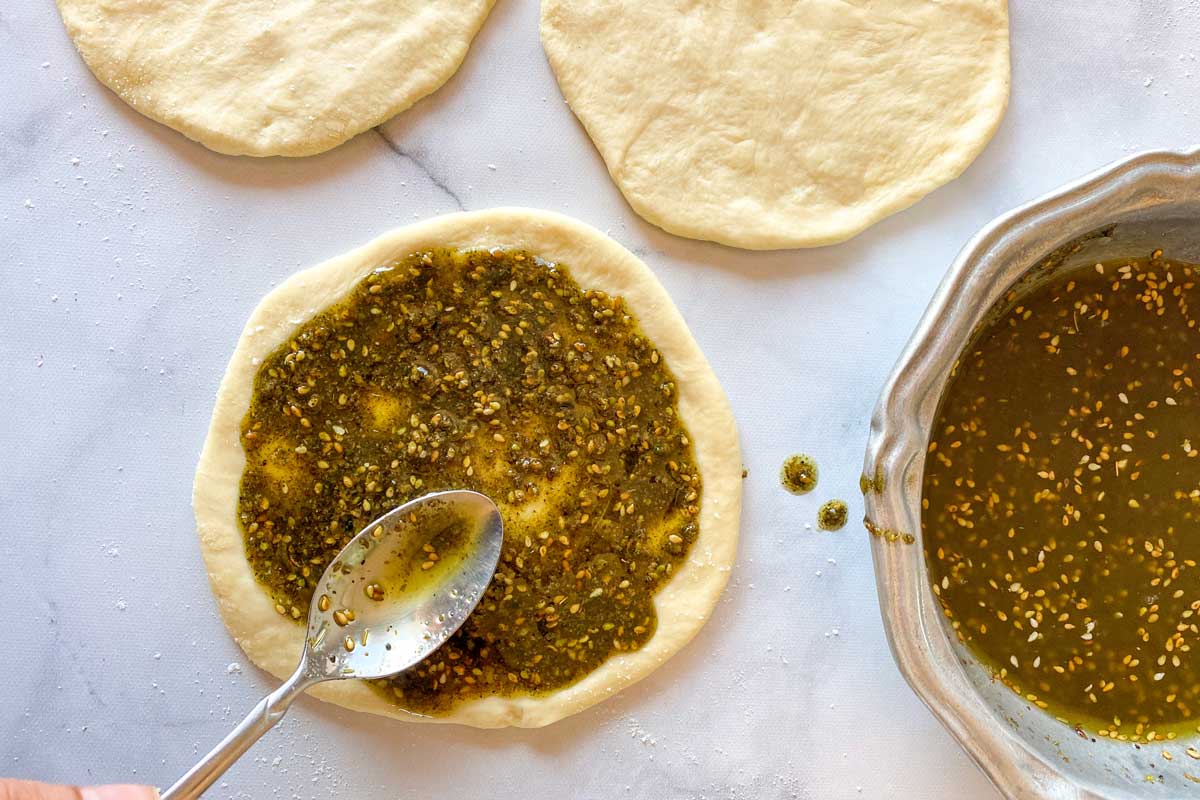
And here’s another bonus filling option, if you’d like to take your fatayer to even newer territory:
Chicken and Potato: Although not traditional, this variation is very delicious, and lately it’s been more common to find in Arabic bakeries.
To make, boil 4 peeled, cubed potatoes until just tender. Meanwhile, sauté 1 diced onion and 4 minced garlic cloves in olive oil until translucent and fragrant. To this, add 1 pound of boneless chicken breast, cut into cubes. Season with 3 tablespoons curry powder, 1 tablespoon garlic powder, and 1/2 tablespoon onion powder. Stir all together and cook for approximately 10 minutes, until the chicken is just tender and nicely seared. Drain the potatoes and add to the filling, seasoning with salt and pepper to taste. Mix together gently and there you have it: a delicious chicken and potato filling to stuff your dough!
Now, are you ready to try making Fatayer? You may be apprehensive, but once you taste them, you'll see why they’re so well-liked across the Middle East and beloved by Arabs everywhere. They are a labor of love but so worth it!
In addition to her delicious Fatayer, Heifa has shared another popular Ramadan recipe with us: Qatayef (Sweet Filled Semolina Pancakes), the perfect sweet treat for your table.